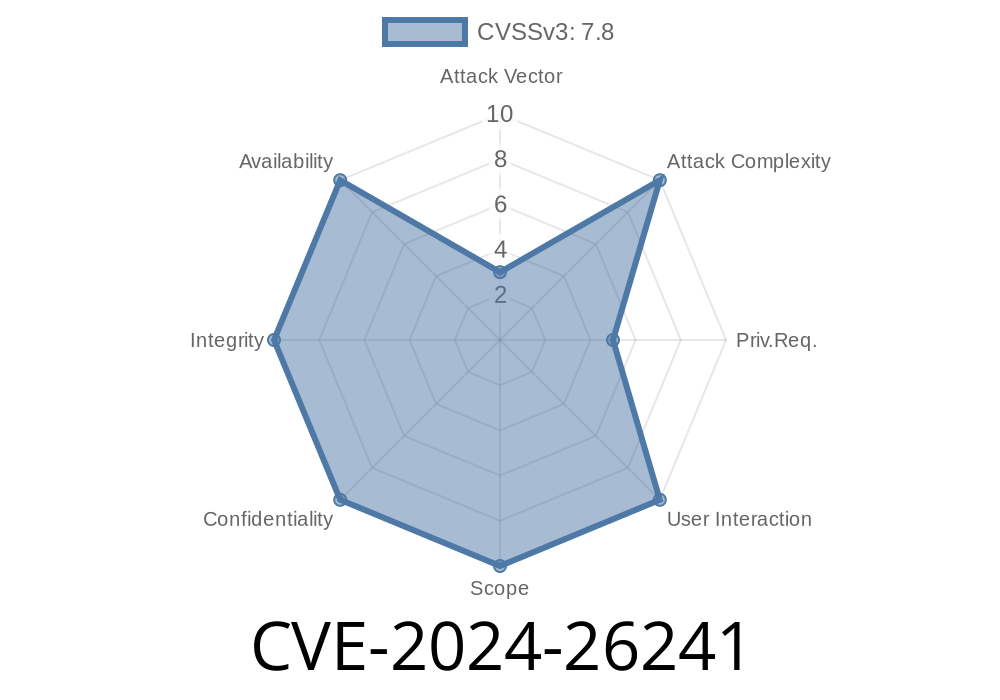---
Introduction
In February 2024, Microsoft patched a major security hole—CVE-2024-26241—in Windows. This flaw (found in the core Win32k driver) allows a normal user to get *System* privileges, opening the door for abuses like malware installation, disabling security tools, or complete system takeover. Let’s break down what this vulnerability is, how it can be exploited, and see some code snippets and resources to understand it better.
Impact: User can become SYSTEM
- Affected Systems: Windows 10/11, Windows Server 2016/2019/2022
CVSS Score: Often rated around 7.8 (High)
Official advisory:
https://msrc.microsoft.com/update-guide/vulnerability/CVE-2024-26241
The flaw exists in the Windows Win32k.sys kernel driver, which handles graphical system calls. Because Win32k is loaded into the Windows kernel, a bug here is quite dangerous.
Understanding the Exploit: How Attackers Leverage CVE-2024-26241
The heart of the problem: Windows doesn’t correctly handle memory or object references in Win32k. With careful interaction, a local user process can trick the kernel into running code at an elevated privilege (SYSTEM) or manipulate protected parts of memory.
Exploit PoC (Proof of Concept) Snippet
> ⚠️ Educational Purposes Only. *Do not try this on any system you do not own or have permission to test.*
Here’s a simplified exploit pattern, *not* a weaponized one, but it shows the logic
// CVE-2024-26241 simplified POC (pseudocode)
#include <windows.h>
#include <stdio.h>
// Assume win32k bug allows us to elevate via a vulnerable syscall.
int main() {
HANDLE hProcess = GetCurrentProcess();
TOKEN_PRIVILEGES tp;
ZeroMemory(&tp, sizeof(tp));
// This would be a buggy kernel call, replaced here by a placeholder.
BOOL ok = CallVulnerableWin32kFunction(hProcess);
if (ok) {
printf("Privilege escalated! Launching SYSTEM shell...\n");
system("cmd.exe");
} else {
printf("Exploit failed.\n");
}
return ;
}
Real world PoCs would use tools like Process Explorer to confirm that SYSTEM-level privileges are obtained.
In-Depth Resources
- Microsoft CVE-2024-26241 Security Guidance
- NVD Record: CVE-2024-26241
- Win32k Privilege Escalation — Detailed Analysis (archive)
- Windows Kernel Exploitation Basics
Mitigation and Patching
PATCH NOW! The only real fix is to update Windows. Microsoft has shipped fixes in the February 2024 Patch Tuesday.
Use Windows Update, or grab your organizations’ patches as soon as you can.
`
...and comparing your OS Build Number with those listed in the MS advisory.
Conclusion
CVE-2024-26241 is another reminder of how powerful and dangerous Win32k vulnerabilities can be. Even though it’s a local exploit (you need to run code on the target device), pairing it with phishing, drive-by downloads, or a compromise of a single corporate laptop can quickly lead to full network breaches.
Monitor for suspicious elevation of privilege events.
*Vulnerability research and security hygiene are more important than ever. Stay safe and updated!*
Timeline
Published on: 04/09/2024 17:15:45 UTC
Last modified on: 04/10/2024 13:24:00 UTC
